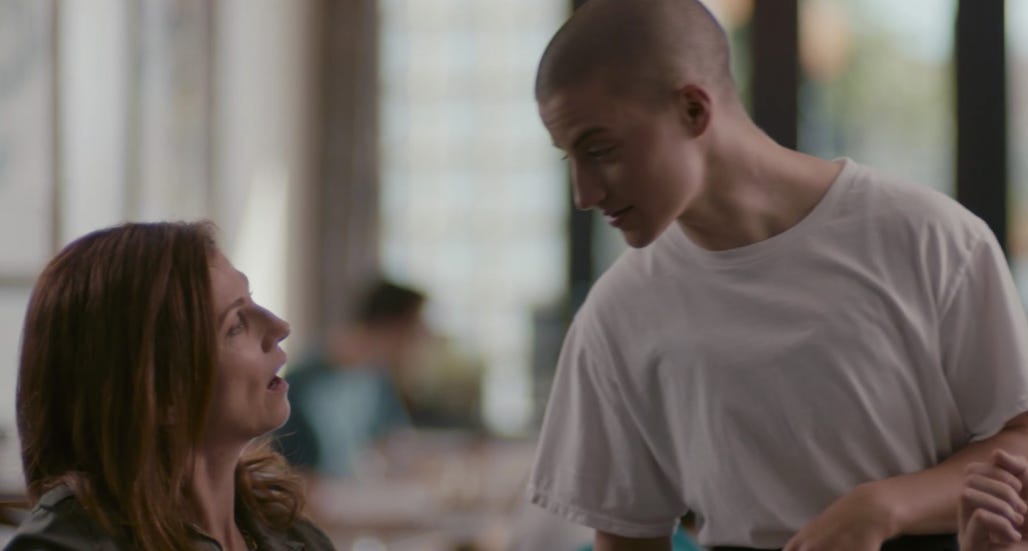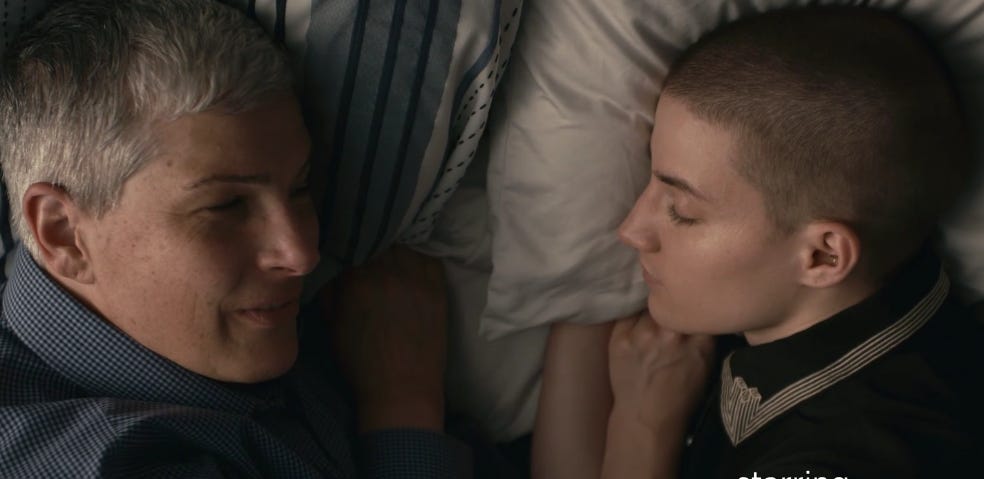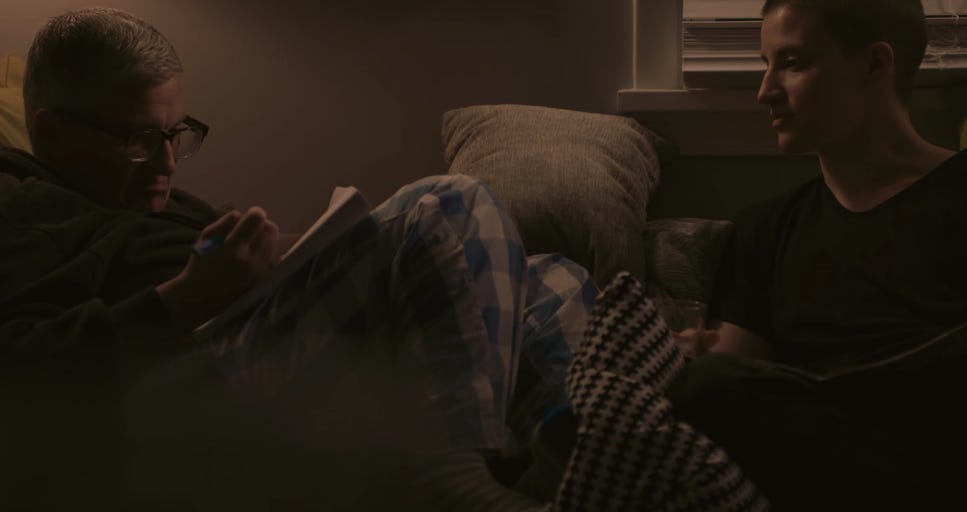Saving Each Other: Work In Progress (2019)
Self-sabotage, denial, responsibility, babyqueers versus bitter middle age, and the discomfort of seeing ourselves
“I’m forty-five; I’m fat; I’m this queer dyke who’s done shit in her life and that is my identity? I’m trying to be a feminist, but I have this prince princess fantasy-- not necessarily a man prince, but I’m like this struggling damsel in fucking distress,” our protagonist says in the first episode of Work In Progress (dir. Abby McEnany and Tim Mason). Abby (played by McEnany) vows to kill herself if in 180 days if she does not feel better. “I’m sick of struggling,” she says. “I’m surrounded by people who are like full selves. And I’m like this building that’s been delayed.” Abby pauses and looks up, and sees that her therapist, who she has been describing her suicidal ideation to for ten minutes, has died mid-session.
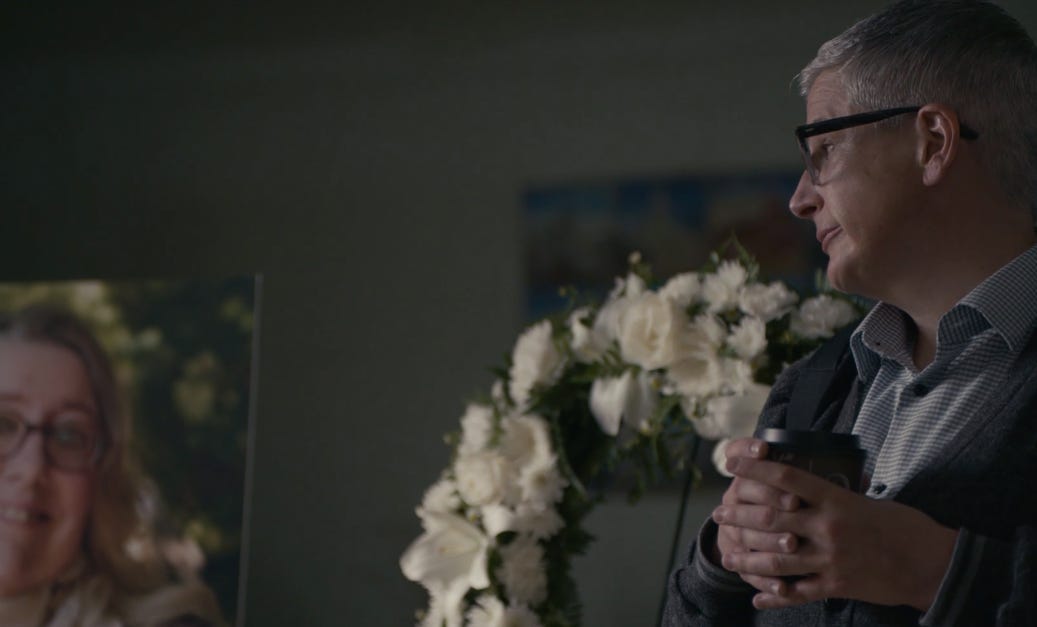
Work In Progress hits home for me and feels specific and real and close to something I have experienced in a way few pieces of media are. Which means--watching Work In Progress, I had to pause a lot. When queer rep becomes more accurate to my specific demographic, it becomes more painful to engage with (see: Torrey Peters’ delightful Detransition, Baby). I wince knowingly at Abby’s loathing of her own existence. Do I really need to watch this incredibly hot, funny woman hate herself and ruin her own life, I find myself wondering? But as much as I feel I have had enough of queer suffering, life contains a lot of suffering mixed in with beauty and sex and love and cute stuff. There are two angles here-- one about age gaps in queer relationships, and one about mental illness and the failure of queer relationships to heal us. It’s a thoughtful, self-aware middle-class-white-queer look at the problems of maturity and responsibility. When queer people find queer love, that love doesn’t necessarily come with inherent understanding, or healing, though we frequently really hope that it will. We really want to fix each other, or be fixed by each other. But can we?
When I was a teenager, other queer people on Tumblr taught me to understand the articulation of moments of profound psychological distress by another queer person as flirtation. This took place in a general online environment centered on images and short text posts, where young people expressed their emerging identities and crises through visuals (for an interesting take on one section of this culture, see “Dolores Logs in”, Ep. 8 of Jamie Loftus’s Lolita Podcast). Many of my first experiences of intimacy were with other online trans teens experiencing crisis. It would go like this: someone you shared literary or other interests with, who also had a limited social circle outside online spaces, would post a picture of their sliced-up arms, or a cryptic and ominous text post. Then they would delete it. Then you would message them, and tell you that you cared about them. They would say you couldn’t possibly. You would then try to prove that you did; it would escalate into a codependent pen-pal-ship bordering on romance that would last until one of you conclusively pissed off the other. My understanding is that this structure wasn’t something unique to me, but rather something that has been reproduced countless times in many gay (in the pejorative sense) contexts. I still find myself struggling to escape it, from both ends.
Shortly after Abby kills her therapist, while at a cafe talking to her exasperated sister about her suicidal ideation, she meets her prince-- shaved-head early-T prettyboy waiter Chris (Theo Germaine), dew-faced and cute in a white t-shirt and little gold earring. She reads him as a hot babydyke, and explodes with jealousy when he jokes with her straight sister Alison (Karin Anglin) instead of her. Her meddling sister gives him her number, and he calls her. Abby tells Chris about her pervasive suicidal ideation on their very first date, and rather than expressing concern and then high-tailing it out of there, he sleeps over. They embark on an intergenerational doomed romance-- ingenue queer baby versus bitter queer elder.
Abby is no sympathetic suffering hero: we find her delightfully awful in many ways. Poorly adjusted, snarky and explosive, deeply self-centered and self-pitying, she lashes out when people don’t read her and understand her automatically, and is defeatist about the possibility of genuinely connecting with another person outside her small circle of white dykes her own age. She attends a Weight Watchers style program, which she hates; she has a temp job she loathes; she is chronically depressed. Like Mo in Bechdel’s DTWOF, she gripes a lot-- she has a bad word for the kiwi Capri Sun at her sister’s son’s soccer game, the way her friends speak to her, her job, the Lyftshare. She’s often unable to extract herself from the matrix of discomfort and despair she carries with her.
But Chris is twenty-two, and even as it’s a huge red flag for romance that Abby hates her life so bad that she is ready to die (and tell him, after knowing him for maybe five hours), he dives in. The narrative doesn’t give us any solid answers about why, but it’s clear to me what Chris sees in her. On their first date, Abby sees Julia Sweeney in a bar and complains loudly to Chris about her authorship of the transphobic SNL character, gender-ambiguous Pat. In flashbacks, it is established that Abby has been compared to Pat by people mocking her rotund gender ambiguity (and presumably, her self-absorbed whining). Chris has no idea who Sweeney is, but, bless his heart, promptly confronts Sweeney, who sweetly apologizes. Abby faints flat on the floor. Sweeney then spends the evening chatting with both of them, expressing guilt for her past transphobic sins and getting along great with Abby, while Chris looks with confusion and adoration at Abby. Silver-haired and strong-jawed and broad-shouldered and solid, Abby really is terribly hot, in, as Thea from DTWOF would say, “a repressed butch bottom way.” She’s sardonic, self-deprecating, shy, curious, and often goofy. She also has an encyclopedic knowledge of random pop culture from before Chris was born; he uses her to cheat at a bar trivia question about Toad The Wet Sprocket.
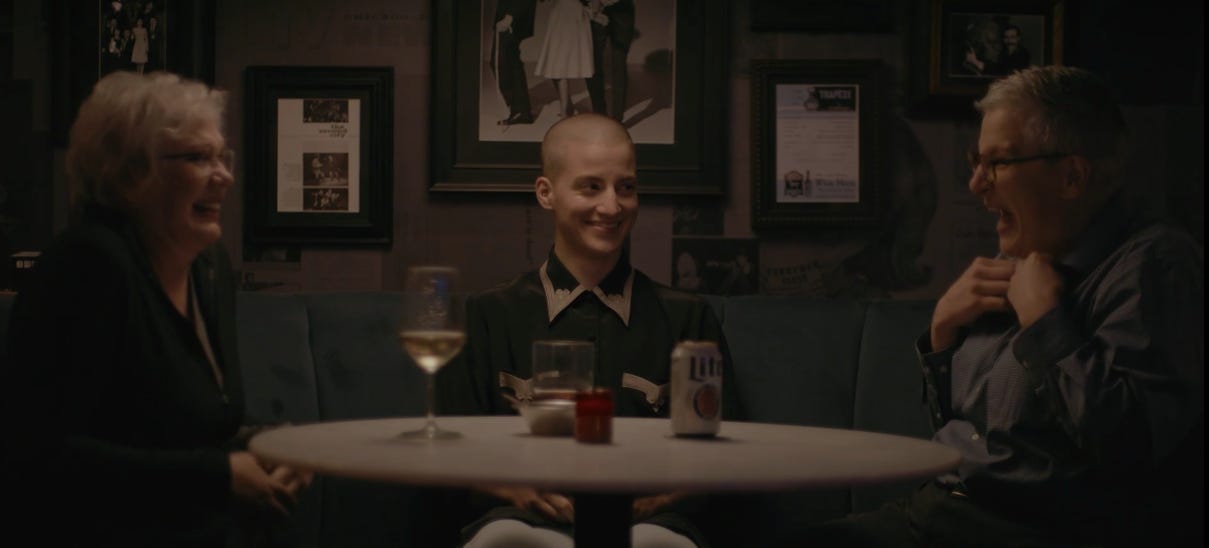
Chris learns from Abby’s friends more information about Abby--namely, that freaking out and fainting in stressful situations--like obsessively washing her hands and compulsively journaling-- has been something that’s been happening “longer than [Chris has] been alive”. Abby confesses to Chris that she has been hoarding a closetful of strange, compulsively-written journals for nearly twenty years; the pile of boxes, all labeled ABBY, is lit by one bulb, a dirty secret that caused a breakup with Melanie (Echaka Agba), her Black ex-girlfriend who dumped her eight years ago after getting fed up with her unwillingness to confront her unsustainable obsessive behaviors. Abby has a fear, left over from past relationships, that if she tells the truth about her mental illness, or her deeper self in general, nobody will love her-- which manifests in masking behaviors and cheerful performances which break down in private into obsessive anxiety. But Chris is chill with everything Abby shows him. For much of the series, the narrative is about how well their intergenerational coupling does really appear to work, and how chill Chris is with... everything. Abby finds acceptance and compassion from her younger boyfriend that she never expected from anyone; her surprise at this is genuinely affecting. Chris takes Abby to brunch; Chris takes her to a BDSM-y burlesque club for baby queers; Chris fucks her well, navigating their similar limits around touch; Chris is the reason that, one day as Abby sits in the park and talks to a photo of her dead therapist on her phone, she feels suddenly happy. A prince saving a damsel in distress?
For Abby, Chris is a solution to the problems of her middle age and unaddressed bad habits; for Chris, Abby is--well, we can only guess. The picture disappears beyond Abby’s vague perception of him; she loves him, more than anything, because he likes her, makes room for her that she does not expect to be made. I love this show for allowing Chris and Abby’s desire and gladness in one another to feel real, even as the relationship itself finds unsteady footing. Nothing about their identities or queer lives is played for laughs. And one thing is sure-- the kid’s earnest. I can certainly project my own reasons for pursuing older people onto him. There are the usual ones: I lack role models who resemble me, I felt an absence of parental love at a crucial developmental stage and seek it now as an adult. For a while, I panicked about my desire for older people, alongside my desire for BDSM or casual sex. But eventually I was won over by both lust and a pragmatic necessity: I need to fuck people who know how to fuck. Older gay people were often better at sex because most of them had done it more and knew what they were in it for; I could feel more confident that they would not fumble at me cluelessly or abruptly change their minds. I also wanted people who could, I imagined, tell me about my own history. When my queer septugenarian Jewish Literature professor referred to gay men’s community as “us” to me one day while I doggedly tailed him to his office, I felt the deepest thrill of my life up to that point. When my first dom, also trans, told me about his experiences as a submissive being loved and tormented by 90s leatherdykes, I boiled with longing and nostalgia for a time before I was born-- and fell all the more in love with his body, his tattoos, his smell, that had been in a place I never would be. If anyone told me a story about a bar that had once existed that no longer did, or lectured me on music, or mentioned a friend of theirs who had been arrested protesting with ACT UP, I was guaranteed to hit them up again for a second date. And if they talked to me about their trauma? Oh boy.
Above: Emerald City interview between Larry Kramer and Vito Russo, 1977, discussing Larry Kramer’s book Faggots, about a gay man worrying about romance vs casual sex as he enters middle age. Initial music clip includes a song and dance by Jeane Fredericks, who sings “Nobody loves a fairy when she’s forty/nobody loves a fairy when she’s old.”
“Chris loves a project,” Chris’s friend King (the beautiful and well-styled Armand Fields) tells Abby. She laughs, and then looks down at the counter, concerned.
In Brian Jordan Alvarez’s comedy sketch, Gay Age Gap, and the sequel, Gay Age Gap 2, a 40-something Queer Elder is dismayed that his paramour doesn’t know who Gena Rowlands is. Our 40-something guy then fucks his 22-year-old lover on the couch as he forces him to watch Paris Is Burning; his baby boy insists on viewing it on a phone screen, then asks “hey, what does your therapist say about me?” I like how bratty, ungenerous, and self-interested the younger person is in this sketch. Work In Progress shows Chris being a perfect, generous lover, but when I’ve dated older people experiencing life changes or crisis, I have always also been in it for myself, even if I fool myself about it. It’s nice to feel pretty, to see my youth from the perspective of someone who values it more than I do. But also— if we can love and receive love from the people who were suffering adults when we were children, then we’re part of the history we’ve missed out on. And if we can heal them, in some way, then maybe the bad stories we know about the past have a happy ending. It’s a nice thought, and a self-aggrandizing one. The problem for twinks like me is that if our elders actually lean hard on us, we may bend like improperly prepared Ikea furniture.
“You’ve never made any mistakes,” a cis thirtysomething lover once said to me in bed, after rattling off some of his own. I tried to protest-- at this point I’d been date-raped in situations I was sure were avoidable, signed and then backed out of an exploitative publishing deal with a notorious sleazy micropress, had friend breakups I had handled badly, lost friends and acquaintances to suicide, and worked a wide range of bad jobs over a short period. But that wasn’t what he meant. During the same conversation, he told me earnestly that he felt ashamed of being attracted to my body because it was “too perfect;” he said it made him feel shallow to want me. Whadda line. Since I was thirteen, I had been hearing from people who felt ashamed of being attracted to my body; a new reason did not make it much better. But I was charmed by his envy, and by his self-deprecation, even as it unsettled me; it made me eager to prove to him how alike we were, really; how much I understood him. He was going through an awful year, and I wanted to show him that I knew what awful years were. I had an idea that I had been through extraordinary quantities of horrible things that had left me hardy but sour, and we could bond over mutual crustiness. But I was not as sour or strong as I thought. In a suffering competition—as this relationship became, before it ended— I would not win. I wasn’t tired or angry or suspicious in the same ways as he was; I had not lost the same friendships, or seen quite as many people hurt or dead in the same contexts. My lover’s investment in his own life’s patterns of misery alerted me to the ways I framed my own similarly. Like Reese in Detransition, Baby (to riff on this post by Kaitlyn Greenidge), I was a little in love with the idea of my own suffering, but a lot of the suffering I had had, I actively sought myself. I had grown up safer, more well-protected than this lover and others--though the things he envied me for were often idiosyncratic. “Trans men can go anywhere they want,” he told me, cryptically. And: “Your body’s like cheating nature.” The source of much of my own adolescent trauma was, to him, a mark of another way my life had moved along more seamlessly, in a more self-actualized way, than his own.
Abby, too, envies transness. Or envies... something. Her whole life, she has been punished for being gender-nonconforming and fat--insulted, scrutinized, and made ashamed, at work and in social situations and in bathrooms. As such, she does have automatic empathy with Chris’s dysphoria and discomfort, and performs fairly well as an ally, telling off cis friends for saying cruel things and proactively calling him her boyfriend in any situation where it’s in doubt. Maybe something deeper lurks underneath. But there’s something else, too, outside of generational gaps and gender trauma. Abby loathes herself, and her obsessive anxieties about the world in general mean that her self loathing has become the centerpiece of her life. After accidentally learning Chris’s deadname (which is, thankfully, censored from the audience with comedic bleeps), Abby enters a self-flagellating spiral of shame about it which becomes all about her. She stops responding to Chris’s calls and texts. Finally, she loudly confesses her deadname-knowledge to Chris while they’re at an art show, imploding dramatically in front of him; he angrily tells her that it is stupid for this to be about her shame, and it was cruel of her to go unresponsive, because he thought he did something wrong. Abby, for her part, fails to realize that she is still operating outside the bounds of reality, going on to hit up her ex Melanie to dump on her, too, about her guilt, and then showing up at Chris’s work to lecture him about how she is trying, and therefore he needs to forgive her right now. Various people have to deal with Abby as she vents about her suicidal fugue, 3/5 of whom are Black (these bits play the same as the bit with Louis and Belize in Angels in America, a picaresque of selfish white guilt written by guilty white people).
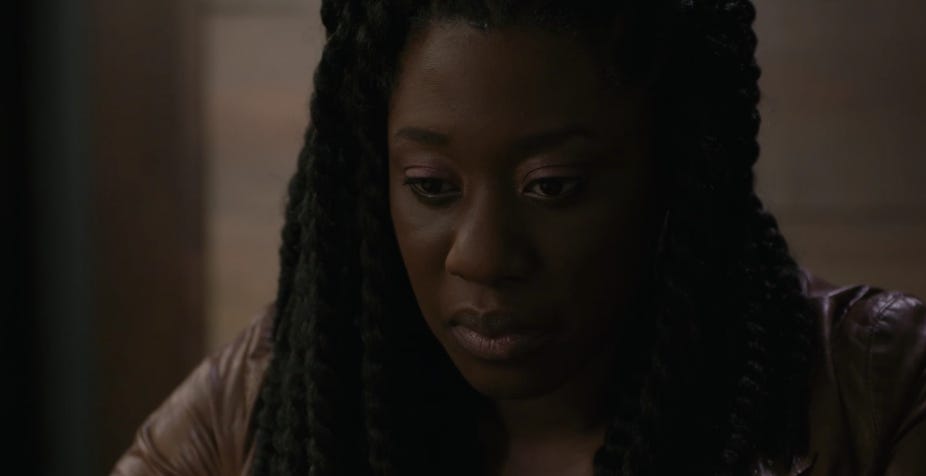
During the course of this auto-rout, Julia Sweeney returns. Julia informs Abby she will be performing in a live show by This American Life that has something to do with... Abby. As it turns out, her innovation is to write a new version of Pat where that the bit is that Pat doesn’t care that people are confused and unsettled by Pat’s gender. Abby hates it, with reason: the new bit is unfunny, and it papers over the violence of the original. Julia has not understood the problem at all, and sees Abby as a way to keep her material fresh. Likewise, Abby does not understand the problem with Chris: she views him as a resource for herself.
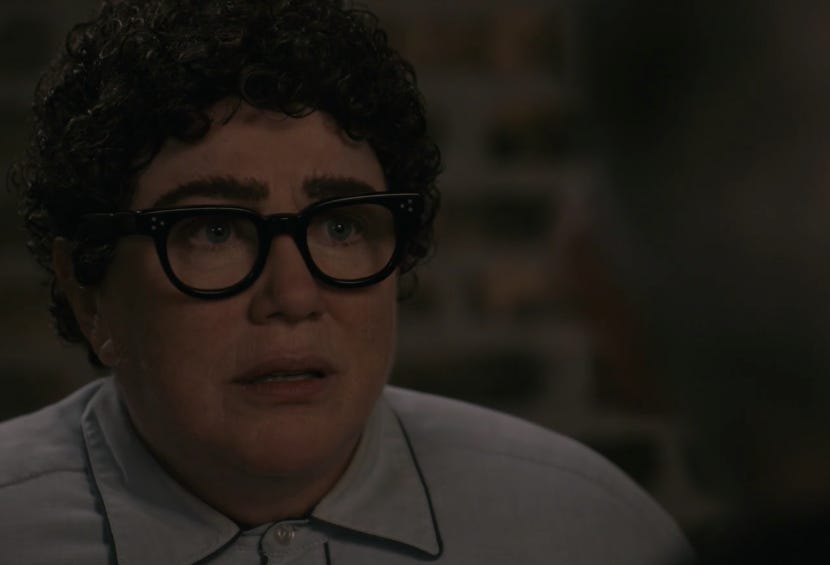
Work In Progress is a show about self-sabotage and midlife crisis and isolation; my main point here is that I enjoy it in the way I enjoy salty black licorice that burns your gums. Its narcissistic narrator compels me; I know I could fall in love with her. I also know that there are versions of myself, who do not adequately work to listen to people around me and tune in to the world, who become her, and are as nasty to the people closest to them. It’s about what happens when you get stuck in your fear of your own badness for so long that there is nothing else outside you any more; in this way it is a horror. The story focuses itself so tightly on Abby that it’s difficult to see the full picture of anyone else’s life, as indeed Abby fails to see outside the narrow, inward range of her own vision. It’s easy to feel sorry for Abby, but there are also moments of resistance and rage which show how frightening she can be when she is at her most vulnerable, and how her pain is transformed into everyone else’s problem, despite the fact that, ultimately, she does have stubborn people who care about her and work to help her navigate life. The problem in her relationship with Chris is not ultimately about age much at all, but about vulnerability and trust and openness to critique.
Gut-scraping stuff, but maybe we like it like that.


